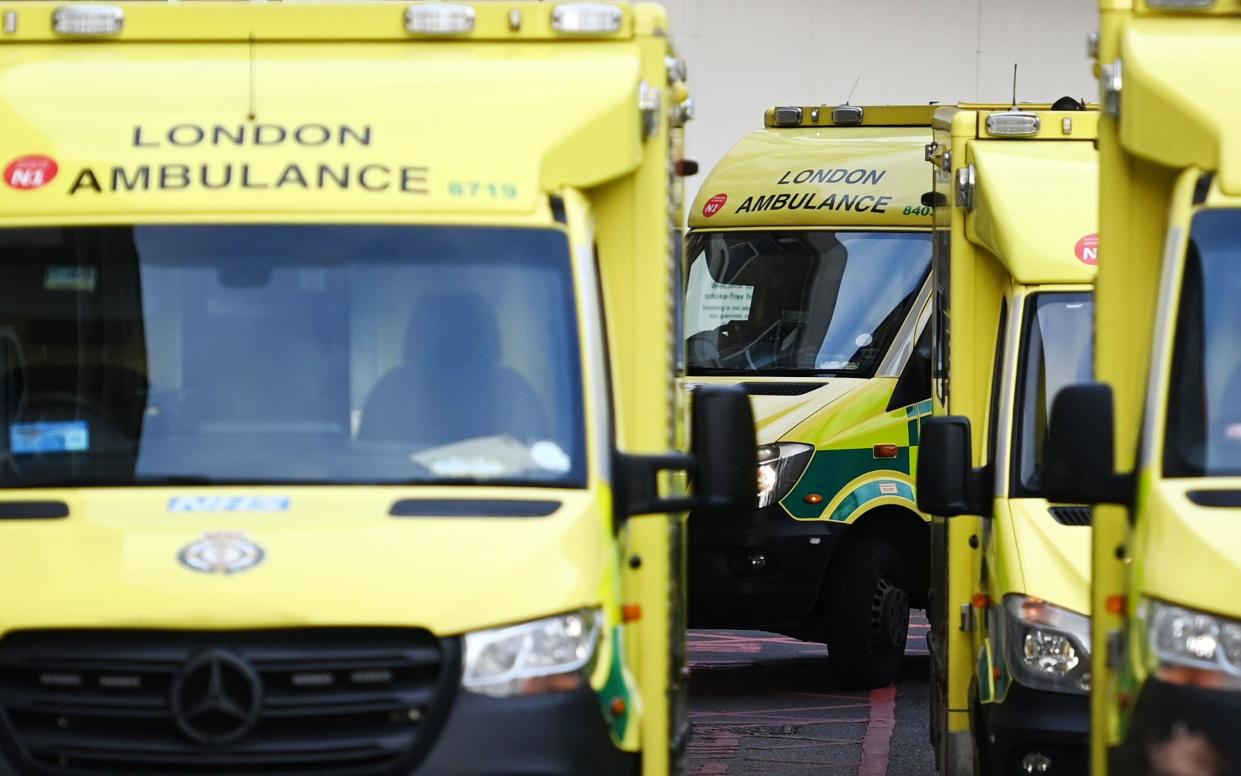Half of patients facing 30-minute average ambulance waits in some areas

Half of patients in some areas of the country are waiting 30 minutes or more in ambulances outside of hospitals, NHS data have shown.
In the East of England, 49.5 per cent of ambulances were delayed outside for at least 30 minutes, while 48.6 per cent were waiting in the South West.
Across the whole of England, three in 10 ambulances were delayed outside hospitals last week, while more than 11,000 - 15 per cent of the total - waited over an hour.
Health chiefs said ambulances have turned into “wards on wheels”, with staff treating patients in the vehicles queuing outside.
Ambulances are unable to transfer patients into hospitals when there is a lack of available beds in emergency departments. Delayed discharges of patients who are fit to leave hospital can cause blockages in the system, meaning there is a lack of available ward beds to admit accident and emergency patients into.
The latest data, published by NHS England, showed that 57.5 per cent of patients remained stuck in hospital last week, despite being well enough to leave.
On average 13,364 beds were occupied every day last week with patients no longer meeting the criteria to reside, up from 13,179 over the previous seven days.
Adrian Boyle, president of the Royal College of Emergency Medicine, said: “The ambulances become wards on wheels, it’s not a great area for people to be waiting outside.”
However, he said: “The bigger problem is the people the ambulance can’t go to because they’re stuck outside the emergency department.”
The data also showed every ambulance last week lost, on average, 19 minutes of time queuing to hand over patients.
Ambulances handing over patients to University Hospitals Plymouth NHS Trust lost 137 minutes on average last week, the highest in the country.
Ambulance delays were highest at East and North Hertfordshire NHS Trust, with more than eight in 10 patients (81.7 per cent) waiting more than 30 minutes outside hospital.
More than a quarter of patients (76.3 per cent) arriving by ambulance at the Queen Elizabeth Hospital, King’s Lynn, NHS Foundation Trust were delayed more than 30 minutes.
Separate figures, uncovered by the Liberal Democrats through Freedom of Information requests, showed that patients are facing a postcode lottery for ambulance response times.
In Mid Devon, patients waited an average of 15 minutes and 20 seconds for Category One calls - which include heart attacks - compared with five minutes and 48 seconds in Hammersmith.
West Devon had the second slowest response time for such calls at 15 minutes and 12 seconds, followed by the South Hams at 14 minutes and 44 seconds.
Some 23,999 handover delays of 30 minutes or longer were recorded across all hospital trusts in the seven days to Nov 27, according to NHS England. This was 31 per cent of the 77,054 arrivals by ambulance.
The proportion stood at 23 per cent at the beginning of Dec 2021, before peaking at 27 per cent at the start of April this year.
Some 11,389 ambulance patients waited more than an hour to be passed to A&E teams, compared with 10,020 the previous week.
NHS trusts in England have a target of 95 per cent of all ambulance handovers to be completed within 30 minutes, with 100 per cent to be completed within 60 minutes.
Professor Sir Stephen Powis, NHS national medical director, said: “These new figures show the NHS is facing a perfect storm, with winter virus cases rapidly increasing alongside ongoing pressures in emergency care and hugely constrained bed capacity.
“We have already said we expect this to be the NHS’s most challenging winter yet, which is why we started preparing earlier than ever before with extensive plans in place to deal with winter boosting bed capacity, including more than 40 control centres to track and manage demand 24-7, which are now live across England.”
Pressures getting worse
The latest figures are included in the second weekly snapshot of how hospitals are performing this season - and they already suggest that pressures are getting worse.
Some 94.8 per cent of hospital ward beds were occupied in the week ending Nov 20, up from 93.9 per cent in the previous seven days.
Hospitals are also being hit by the hardest early flu season in at least a decade, with hospital rates for the virus more than double that seen in the previous high set in the 2019-20 season.
In the latest weekly winter update, the number of patients in hospital with flu increased by 40 per cent compared with the previous week - with an average of 482 flu cases in hospital each day last week, up from 344.

 Yahoo Movies
Yahoo Movies 
